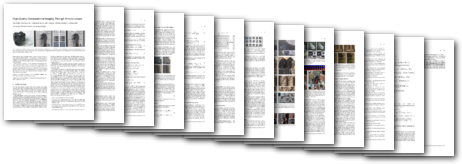Our system reliably estimates point spread functions of a given optical system, enabling the capture of high-quality imagery through poorly performing lenses. From left to right: Camera with our lens system containing only a single glass element (the plano-convex lens lying next to the camera in the left image), unprocessed input image, deblurred result.
Abstract
Modern imaging optics are highly complex systems consisting of up to two dozen individual optical elements. This complexity is required in order to compensate for the geometric and chromatic aberrations of a single lens, including geometric distortion, field curvature, wavelength-dependent blur, and color fringing.
In this paper, we propose a set of computational photography techniques that remove these artifacts, and thus allow for post-capture correction of images captured through uncompensated, simple optics which are lighter and significantly less expensive. Specifically, we estimate per-channel, spatially-varying point spread functions, and perform non-blind deconvolution with a novel cross-channel term that is designed to specifically eliminate color fringing.
|
|








